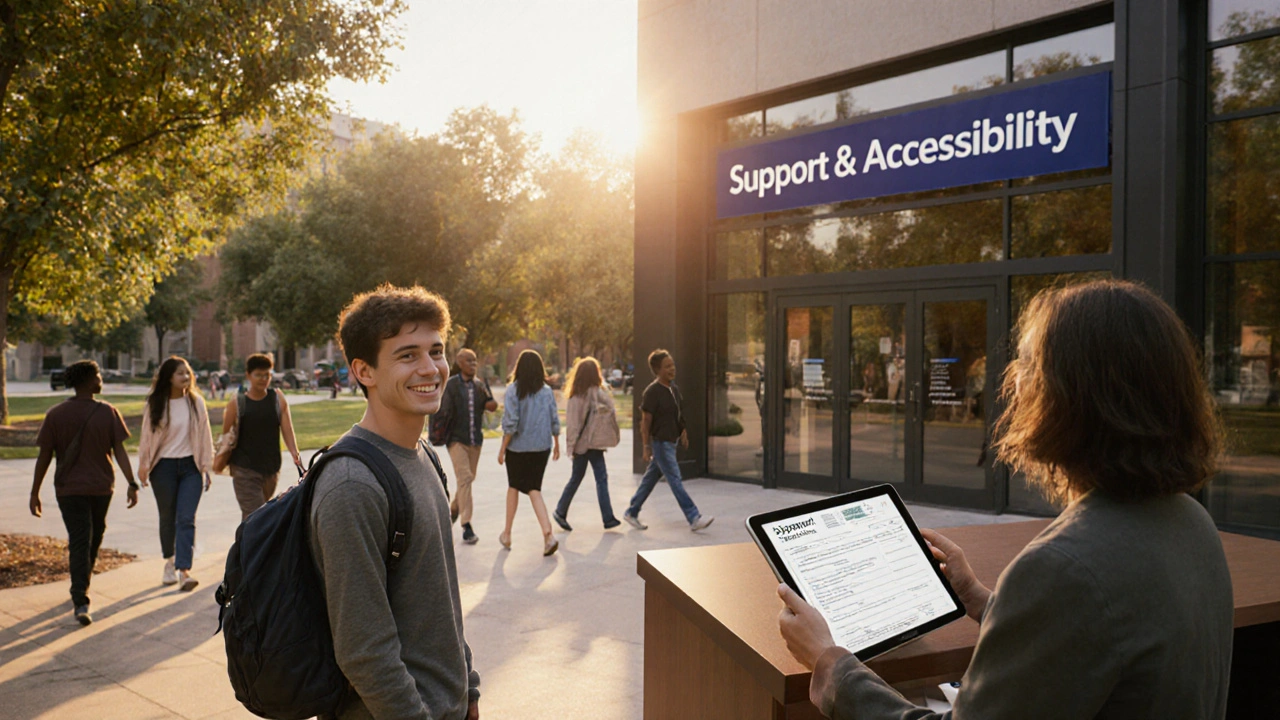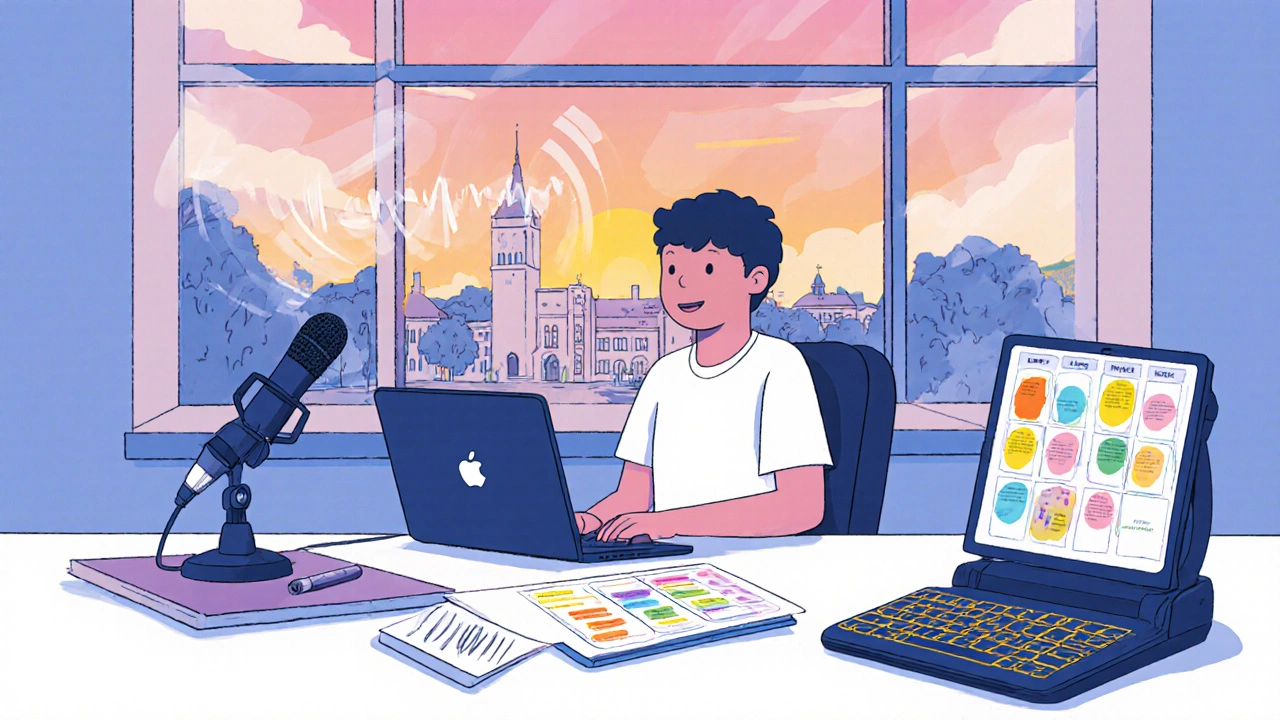College Life with Intellectual Disabilities: A Guide to Navigating Higher Education
 Oct, 12 2025
Oct, 12 2025
College Transition Planner
Step 1: Identify Your Academic Needs
Select the areas where you need support:
Step 2: Your Recommended Accommodations
Select your needs above to see recommended accommodations for your 504 Plan.
Step 3: Next Steps with Your DSO
After selecting your needs and accommodations, click 'Get My Plan' to see your personalized next steps.
Key Takeaways
- Legal protections like the ADA and Section 504 guarantee reasonable accommodations on campus.
- The Disability Services Office (DSO) is the first stop for arranging support.
- Assistive technology and structured study habits level the playing field.
- Self‑advocacy and peer mentoring boost social confidence.
- Early transition planning links high school IEPs to college 504 Plans.
When a student with intellectual disability enrolls in college, the experience can feel both exciting and overwhelming. Intellectual disability is a lifelong condition marked by limitations in intellectual functioning and adaptive behavior often requires tailored support to thrive in a higher‑education setting.
Understanding Intellectual Disability in the College Context
College curricula assume a certain level of abstract reasoning, fast reading, and independent study. For students whose cognitive profile includes slower processing speed, limited memory retention, or challenges with executive function, these expectations can become barriers. Yet research from the National Center for Education Statistics (2023) shows that roughly 4% of undergraduate students identify as having an intellectual disability, and enrollment rates have risen by 12% over the past five years. This growth reflects both better outreach and a shift toward more inclusive campus cultures.
Most students enter college after transitioning from a high‑school Individualized Education Program (IEP). The IEP’s goal is to equip the learner with functional skills, but its focus often stops at graduation. In higher education, the equivalent is a 504 Plan, which translates those skills into concrete college‑level accommodations.
Legal Framework and Student Rights
Two federal statutes protect students with disabilities:
- Americans with Disabilities Act (ADA) ensures equal access to public programs, including colleges
- Section 504 of the Rehabilitation Act requires institutions that receive federal funds to provide reasonable accommodations
Both laws obligate the institution to engage in an interactive process: the student discloses the disability, the school evaluates needs, and a written accommodation plan is created. Failure to comply can trigger complaints to the Office for Civil Rights (OCR) and potential loss of federal funding.

Core Support Services on Campus
The first point of contact is usually the Disability Services Office (DSO) a centralized unit that coordinates assessments, documentation, and accommodation implementation. Here’s what the DSO typically handles:
- Reviewing medical and psychological documentation.
- Crafting a personalized 504 Plan.
- Liaising with professors to set up testing accommodations, note‑taking services, or extended deadlines.
- Providing access to assistive technology labs.
- Connecting students to tutoring and peer‑mentor programs.
Many campuses also maintain a Transition Services Coordinator who helps bridge high‑school IEP goals with college expectations. This role is especially helpful for students whose families are navigating guardianship or financial aid paperwork for the first time.
Assistive Technology and Learning Tools
Assistive technology (AT) is the great equalizer. Below are the most common tools for students with intellectual disabilities:
- Screen readers - Convert text to speech for students with reading challenges.
- Speech‑to‑text software - Allows oral responses to be transcribed into written assignments.
- Digital organizers - Visual calendars (e.g., Google Calendar with color‑coded alerts) keep track of deadlines.
- Structured note‑taking apps - Tools like OneNote provide templates for breaking down lecture content into bite‑size sections.
- Adaptive keyboards - Larger keys or simplified layouts reduce motor‑skill errors.
Most universities offer a loan program through the DSO’s AT lab, meaning students can try devices before committing to purchase. The key is to match the tool to the specific skill gap - a student who struggles with reading speed benefits more from a screen reader than from a fancy laptop.
Academic Strategies and Inclusive Curriculum
Beyond technology, structured study habits make a huge difference. Consider the following evidence‑based strategies:
- Chunking - Break readings into 10‑page segments, followed by a brief summary.
- Graphic organizers - Concept maps help visualize relationships between ideas.
- Frequent low‑stakes quizzes - Provide immediate feedback and reinforce memory.
- Dual‑mode instruction - Combine spoken lecture with written slides to support multiple learning pathways.
Professors who adopt universal design for learning (UDL) principles inadvertently boost success for all students, not just those with disabilities. For instance, offering captions on video lectures satisfies both needs for accessibility and for students who prefer reading along.

Social Integration and Self‑Advocacy
Feeling isolated is a common complaint. Colleges that foster inclusive social spaces help mitigate that. Here are three approaches that work well:
- Peer mentorship programs - Pairing a newcomer with an upper‑class student who has similar support needs creates a reliable social anchor.
- Club participation - Special interest clubs (e.g., coding, art, gaming) provide low‑pressure environments to practice communication.
- Self‑advocacy workshops - The DSO often hosts sessions on how to request accommodations, negotiate deadlines, and communicate strengths to faculty.
Practicing self‑advocacy early builds confidence for later career negotiations. A simple script-"I use a screen reader for my textbooks; could you provide digital PDFs?"-is often enough to get the needed support.
Planning for Success: Transition, Guardianship, and Career Pathways
Transition planning doesn’t stop at graduation day. Students should consider:
- Legal guardianship or power of attorney - Determine who can make financial or medical decisions if needed.
- Vocational rehabilitation services - State agencies offer job‑training grants and supported employment programs.
- Internship pipelines - Many universities partner with local businesses to create entry‑level roles that accommodate on‑the‑job coaching.
Creating a post‑college roadmap during the senior year, with input from the DSO, career services, and family, reduces uncertainty and improves employment outcomes. A 2024 study by the Institute for Education and Workforce found that students with intellectual disabilities who completed an individualized transition plan were 35% more likely to secure competitive employment within a year of graduation.
Comparison of Campus Support Options
| Resource | Primary Focus | Typical Services | Best For |
|---|---|---|---|
| Disability Services Office (DSO) | Legal compliance & accommodations | 504 Plans, AT loan, exam modifications | Students needing formal accommodations |
| Academic Advising Center | Course planning & credit tracking | Degree audits, schedule optimization | Students balancing course load with support needs |
| Peer Mentoring Program | Social integration | One‑on‑one mentorship, study groups | Students looking for community and study partners |
| Student Success Center | Skill‑building workshops | Time‑management labs, note‑taking clinics | Students who benefit from structured skill training |
Frequently Asked Questions
Do I have to disclose my disability to enroll?
Disclosure is voluntary, but without it you won’t receive accommodations. Most schools require documentation before the semester starts to ensure timely support.
Can I get a reduced course load?
Yes. A 504 Plan can include a reduced credit load if it’s deemed necessary for academic success. Work with your DSO and academic advisor to file the request.
What if a professor refuses to honor my accommodation?
Document the refusal and contact the DSO immediately. The office will intervene, and if needed, file a complaint with the campus TitleIX/Office for Civil Rights.
Are there scholarships specifically for students with intellectual disabilities?
Several foundations-such as the National Association of State Directors of Special Education (NASDSE) and the American Association on Intellectual and Developmental Disabilities (AAIDD)-offer merit‑based awards. Your DSO’s financial‑aid office can provide a current list.
How do I transition from a high‑school IEP to a college 504 Plan?
Start the conversation with the DSO during summer before enrollment. Bring the final IEP, recent evaluations, and a letter from your high‑school transition coordinator. The DSO will translate key goals into college‑level accommodations.
Higher education can be a rewarding chapter for students with intellectual disabilities, provided they tap into the right mix of legal rights, campus resources, technology, and personal strategies. By taking a proactive approach-registering early with the DSO, mastering assistive tools, and building a supportive peer network-students can not only succeed academically but also develop the confidence to thrive beyond the campus walls.

Mayra Oto
October 12, 2025 AT 04:13Understanding the cultural context of disability services can really shape a student's experience; many campuses incorporate community‑focused mentorship programs that respect diverse backgrounds, and that helps students feel a sense of belonging from day one.
S. Davidson
October 12, 2025 AT 18:06While the guide lists standard accommodations, it's worth noting that the legal framework extends beyond the ADA-state‑specific statutes often impose additional obligations, and students should verify whether their institution's policy aligns with those requirements.
Haley Porter
October 13, 2025 AT 05:13From a systems‑theoretic perspective, the interplay between executive‐function deficits and academic scaffolding necessitates an integrative model where metacognitive self‑regulation strategies are codified within the 504 Plan, thereby operationalizing neurodiversity as a variable in the educational ontology.
Samantha Kolkowski
October 13, 2025 AT 14:56i think the peer mentorship thing is cool but it can be a little hit or miss depending on how the program is run, sometimes you get a great match and other times its just random.
Nick Ham
October 13, 2025 AT 23:16Assistive tech is a game changer.
Jennifer Grant
October 14, 2025 AT 10:23The guide rightly emphasizes early engagement with the Disability Services Office as the cornerstone of a successful transition. By initiating the interactive process before the semester begins, students can secure necessary accommodations without the scramble of mid‑term adjustments. Moreover, the recommendation to pair visual calendar systems with color‑coding directly addresses the executive function challenges common among individuals with intellectual disabilities. Research shows that visual organization tools improve on‑task focus by up to 30 percent in this population. The inclusion of speech‑to‑text software not only mitigates writing difficulties but also aligns with universal design for learning principles. When professors provide both spoken and written lecture materials, they inadvertently create a more inclusive classroom for all learners. The section on self‑advocacy workshops is particularly valuable because it equips students with concise scripts that demystify the accommodation request process. A simple line such as “I use a screen reader for my textbooks; could you provide digital PDFs?” often resolves what could otherwise be a bureaucratic impasse. The guide’s attention to memory retention strategies, like structured review sessions with tutors, reflects an evidence‑based approach to long‑term knowledge consolidation. Frequent low‑stakes quizzes, as highlighted, serve as both formative assessment and reinforcement, thereby reducing test anxiety over time. It is also prudent for students to explore campus loan programs for assistive devices, as the cost barrier can be a hidden obstacle to technology adoption. Transition planning that extends beyond graduation, including discussions of legal guardianship and vocational rehabilitation, acknowledges the lifespan perspective of disability support. Partnerships with local businesses for internship pipelines provide real‑world contexts where accommodations can be practiced and refined. The comparative table of campus resources succinctly visualizes where each service fits into the student’s support ecosystem. Ultimately, the guide’s holistic approach-combining legal rights, technology, academic strategies, and social integration-offers a robust roadmap for students navigating higher education. By proactively leveraging these resources, students with intellectual disabilities can not only meet academic standards but also cultivate confidence that extends into post‑college life.
Kenneth Mendez
October 14, 2025 AT 18:43i've heard some schools keep the assistive tech loan program under wraps unless you know the right admin, so don't trust the brochure alone.
Gabe Crisp
October 15, 2025 AT 01:40While anecdotal reports exist, official policies mandate transparent access, and any deviation should be formally documented.
Paul Bedrule
October 15, 2025 AT 08:36In the grand schema of institutional praxis, the 504 Plan operates as a heuristic device, calibrating the dialectic between normative academic expectations and neurocognitive variance.
yash Soni
October 15, 2025 AT 15:33Sure, because a heuristic device will magically fix all the bureaucratic red tape, right?
Emily Jozefowicz
October 15, 2025 AT 22:30Honestly, the guide hits the sweet spot-mixing solid advice with a splash of flair, so students get both the roadmap and the pep talk they need.
Franklin Romanowski
October 16, 2025 AT 05:26It's encouraging to see such comprehensive advice; having clear steps can really ease the anxiety many students feel when stepping onto campus for the first time.
Mustapha Mustapha
October 16, 2025 AT 12:23Agreed, and I'd add that connecting with a peer mentor early on can further shorten the adjustment curve.
Ben Muncie
October 16, 2025 AT 19:20But remember, no guide replaces personal trial and error.